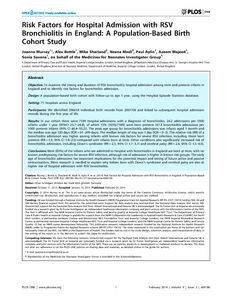Murray, J; Bottle, A; Sharland, M; Modi, N; Aylin, P; Majeed, A; Saxena, S; Medicines for Neonates Investigator Group
(2014)
Risk factors for hospital admission with RSV bronchiolitis in England: a population-based birth cohort study.
PLoS One, 9 (2).
e89186.
ISSN 1932-6203
https://doi.org/10.1371/journal.pone.0089186
SGUL Authors: Sharland, Michael Roy
![[img]](https://openaccess.sgul.ac.uk/105416/1.hassmallThumbnailVersion/Risk_factors_hospital_admission_RSV_Bronchiolitis.pdf)  Preview |
|
["document_typename_application/pdf; charset=binary" not defined]
Published Version
Download (291kB)
| Preview
|
Abstract
OBJECTIVE: To examine the timing and duration of RSV bronchiolitis hospital admission among term and preterm infants in England and to identify risk factors for bronchiolitis admission.
DESIGN: A population-based birth cohort with follow-up to age 1 year, using the Hospital Episode Statistics database. SETTING: 71 hospitals across England.
PARTICIPANTS: We identified 296618 individual birth records from 2007/08 and linked to subsequent hospital admission records during the first year of life.
RESULTS: In our cohort there were 7189 hospital admissions with a diagnosis of bronchiolitis, 24.2 admissions per 1000 infants under 1 year (95%CI 23.7-24.8), of which 15% (1050/7189) were born preterm (47.3 bronchiolitis admissions per 1000 preterm infants (95% CI 44.4-50.2)). The peak age group for bronchiolitis admissions was infants aged 1 month and the median was age 120 days (IQR = 61-209 days). The median length of stay was 1 day (IQR = 0-3). The relative risk (RR) of a bronchiolitis admission was higher among infants with known risk factors for severe RSV infection, including those born preterm (RR = 1.9, 95% CI 1.8-2.0) compared with infants born at term. Other conditions also significantly increased risk of bronchiolitis admission, including Down's syndrome (RR = 2.5, 95% CI 1.7-3.7) and cerebral palsy (RR = 2.4, 95% CI 1.5-4.0).
CONCLUSIONS: Most (85%) of the infants who are admitted to hospital with bronchiolitis in England are born at term, with no known predisposing risk factors for severe RSV infection, although risk of admission is higher in known risk groups. The early age of bronchiolitis admissions has important implications for the potential impact and timing of future active and passive immunisations. More research is needed to explain why babies born with Down's syndrome and cerebral palsy are also at higher risk of hospital admission with RSV bronchiolitis.
| Item Type: |
Article
|
| Additional Information: |
© 2014 Murray et al. This is an open-access article distributed under the terms of the Creative Commons Attribution License, which permits unrestricted use, distribution, and reproduction in any medium, provided the original author and source are credited. |
| Keywords: |
Bronchiolitis, Viral, Cohort Studies, England, Hospitalization, Humans, Patient Admission, Respiratory Syncytial Virus Infections, Risk Factors, Science & Technology, Multidisciplinary Sciences, Science & Technology - Other Topics, MULTIDISCIPLINARY SCIENCES, SYNCYTIAL-VIRUS-INFECTION, YOUNG-CHILDREN, DISEASE, INFANTS, BURDEN, General Science & Technology, MD Multidisciplinary |
| SGUL Research Institute / Research Centre: |
Academic Structure > Infection and Immunity Research Institute (INII) |
| Journal or Publication Title: |
PLoS One |
| ISSN: |
1932-6203 |
| Language: |
eng |
| PubMed ID: |
24586581 |
| Web of Science ID: |
WOS:000332389000030 |
| Dates: |
| Date |
Event |
| 2014-02-26 |
Published |
|
 |
Download EPMC Full text (HTML)
|
 |
Go to PubMed abstract |
| URI: |
https://openaccess.sgul.ac.uk/id/eprint/105416 |
| Publisher's version: |
https://doi.org/10.1371/journal.pone.0089186 |
Statistics
Item downloaded times since 19 Jan 2015.
Actions (login required)
 |
Edit Item |



